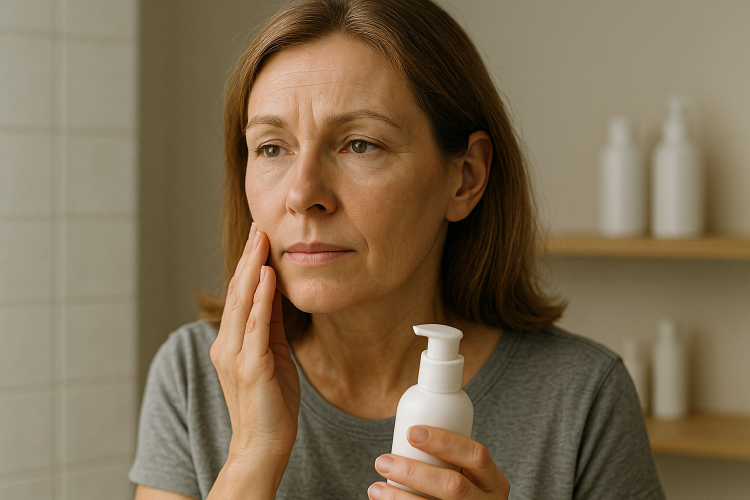Your 30s & 40s Skincare: Building an Effective, Gentle Routine
Learn how to build a balanced skincare routine in your 30s and 40s, incorporating powerful actives without causing irritation. Focus on gentle steps & essential protection.

- Seo Yuna
- 3 min read

Building Your Skincare Routine in Your 30s and 40s
Navigating skincare in your 30s and 40s often involves seeking out potent ingredients to address evolving concerns like fine lines, texture changes, and loss of firmness. While active ingredients can be incredibly beneficial, integrating them correctly is key to achieving results without irritating your skin.
Discussions around effective skincare often highlight the power of ingredients like chemical exfoliants and retinoids. However, they also frequently raise important cautions about combining these powerhouses and the need for a gentle approach.
The Role of Key Actives
Certain ingredients are widely recommended for supporting skin health and addressing signs of aging in your 30s and 40s:
- Retinoids (Retinol, Retinal, Prescription Forms): These are gold standard ingredients known for boosting collagen production, increasing cell turnover, and improving the appearance of wrinkles, texture, and hyperpigmentation.
- Chemical Exfoliants (AHAs like Glycolic or Lactic Acid, BHAs like Salicylic Acid): These help to gently slough off dead skin cells, revealing brighter skin, improving texture, and helping with clogged pores.
The Risk of Over-Exfoliation and Irritation
While both retinoids and chemical exfoliants are effective, using them together or too frequently can overwhelm the skin’s barrier, leading to redness, flaking, sensitivity, and discomfort. Many find that combining strong acid exfoliants and retinoids in the same routine, or even on consecutive nights, is simply too harsh for their skin.
A common pitfall is adopting a routine that is overly aggressive. A truly effective routine prioritizes skin health and barrier function, allowing active ingredients to work without causing damage.
Creating a Balanced & Sustainable Routine
Instead of layering multiple potent actives, consider a strategy that allows your skin to benefit from these ingredients without excessive stress:
- Staggering Actives: Use a chemical exfoliant on one night and a retinoid on another. This provides the benefits of both without direct overlap. Include nights dedicated solely to hydration and barrier repair.
- Listen to Your Skin: Pay attention to how your skin responds. Mild redness or tingling can be normal when starting actives, but persistent irritation, burning, or excessive peeling are signs you need to reduce frequency or strength.
- Gentle Application: When using liquid exfoliants, a gentle swipe with a cotton pad is usually sufficient. Avoid unnecessary pressure, as this can contribute to irritation, especially since chemical exfoliation works via chemistry, not friction.
The Non-Negotiable Foundations
Regardless of the actives you choose, these steps are essential:
- Cleansing: Choose a gentle cleanser. Not all foaming cleansers are harsh; many are formulated to cleanse effectively without stripping the skin’s natural oils. Look for formulations with a skin-friendly pH.
- Hydration & Moisturizing: Support your skin barrier with a good moisturizer. Ingredients like hyaluronic acid are excellent humectants, drawing moisture into the skin. A well-formulated moisturizer provides essential hydration and helps keep the skin calm and resilient.
- Daily Sun Protection: This is paramount, particularly when using ingredients like retinoids and AHAs that increase photosensitivity. Applying a broad-spectrum SPF 30 or higher every morning is the single most effective step against premature aging and protecting your skin while using actives.
Exploring Other Beneficial Ingredients
Consider incorporating other versatile ingredients that can complement or serve as alternatives to stronger actives:
- Vitamin C: A potent antioxidant that brightens the complexion, protects against environmental damage, and supports collagen.
- Azelaic Acid: Known for its anti-inflammatory properties, it can help with redness, rosacea, mild acne, and hyperpigmentation, often with less irritation potential than retinoids or AHAs.
Your Personal Skincare Guide
A good skincare approach provides general principles, but the best routine is ultimately personalized to your skin’s unique needs and tolerance. Focus on consistency, gentleness, and the foundational steps of cleansing, moisturizing, and sun protection, while gradually introducing actives that target your specific concerns.
Unlock Your Healthiest Skin – Backed by Science and Personalization
Cosmi is your personal AI cosmetologist — offering tailored skincare recommendations and expert advice based on your unique skin type, concerns, and goals.
Visit Cosmi